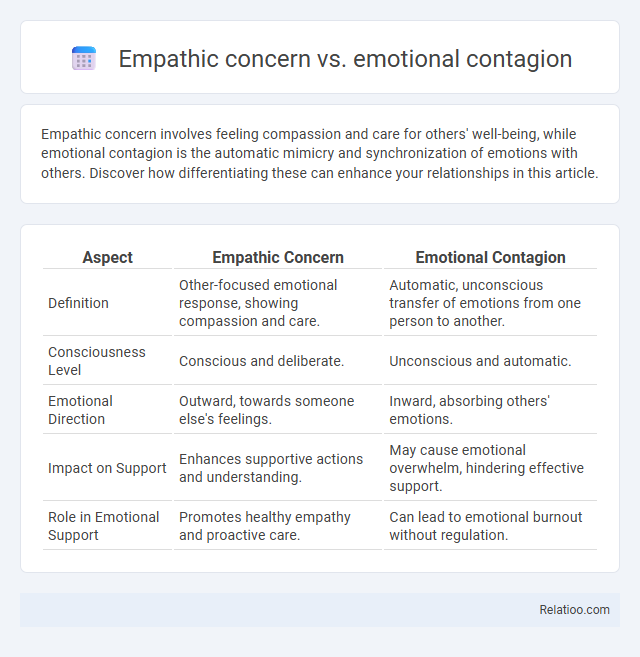Empathic concern involves feeling compassion and care for others' well-being, while emotional contagion is the automatic mimicry and synchronization of emotions with others. Discover how differentiating these can enhance your relationships in this article.
Table of Comparison
| Aspect | Empathic Concern | Emotional Contagion |
|---|---|---|
| Definition | Other-focused emotional response, showing compassion and care. | Automatic, unconscious transfer of emotions from one person to another. |
| Consciousness Level | Conscious and deliberate. | Unconscious and automatic. |
| Emotional Direction | Outward, towards someone else's feelings. | Inward, absorbing others' emotions. |
| Impact on Support | Enhances supportive actions and understanding. | May cause emotional overwhelm, hindering effective support. |
| Role in Emotional Support | Promotes healthy empathy and proactive care. | Can lead to emotional burnout without regulation. |
Introduction to Empathic Concern and Emotional Contagion
Empathic concern involves other-oriented feelings of compassion and care for someone in distress, promoting prosocial behavior and emotional support. Emotional contagion refers to the automatic mirroring and synchronization of another person's emotions, often occurring unconsciously through facial expressions or tone. While empathic concern motivates active helping, emotional contagion primarily leads to shared emotional experiences without intentional intervention.
Defining Empathic Concern
Empathic concern is a distinct emotional response characterized by feelings of compassion and care for another person's suffering, motivating prosocial behavior. Unlike emotional contagion, which involves automatically mirroring another's emotions, empathic concern involves an other-focused perspective that promotes helping actions. Your ability to cultivate empathic concern enhances meaningful social connections and fosters supportive interpersonal relationships.
Understanding Emotional Contagion
Emotional contagion involves the automatic mimicry and synchronization of emotions between individuals, often occurring unconsciously and influencing social interactions. Empathic concern refers to the other-oriented feelings of compassion and care that motivate prosocial behavior, distinct from emotional contagion's more automatic and less regulated emotional responses. Understanding emotional contagion highlights its role in shaping group dynamics by facilitating shared emotional experiences, which can either enhance social bonding or amplify negative moods.
Key Differences Between Empathic Concern and Emotional Contagion
Empathic concern involves an other-oriented emotional response characterized by feelings of compassion and a desire to help someone in distress, while emotional contagion refers to the automatic mirroring of another person's emotions without conscious awareness or intention. Key differences include empathic concern's deliberate cognitive processing and motivation to alleviate pain, contrasting with emotional contagion's subconscious and involuntary emotional synchronization. Empathic concern is associated with perspective-taking and prosocial behavior, whereas emotional contagion primarily results in shared affective states without necessarily prompting helping actions.
Psychological Mechanisms Behind Both Processes
Empathic concern involves feeling compassion and care for another's well-being, driven by cognitive processes such as perspective-taking and emotional regulation. Emotional contagion operates through automatic, unconscious mimicry and synchronization of another person's emotions, activating mirror neuron systems. Understanding these psychological mechanisms helps you differentiate between self-oriented emotional responses and other-oriented empathy, which is crucial for effective social interactions and emotional support.
Impact on Interpersonal Relationships
Empathic concern fosters positive interpersonal relationships by promoting compassion and supportive behaviors, enhancing trust and emotional bonding between individuals. Emotional contagion can influence relationships by automatically transferring moods, which may either strengthen empathy or create emotional overload if negative emotions dominate. Distinguishing empathic concern from emotional contagion enables better emotional regulation, leading to healthier communication and more balanced social interactions.
Empathic Concern in Mental Health and Wellbeing
Empathic concern involves experiencing feelings of compassion and care for others' suffering, distinct from emotional contagion, which is the automatic mirroring of others' emotions without conscious awareness. In mental health and wellbeing, empathic concern promotes prosocial behavior and fosters emotional support, reducing stress and enhancing social connectedness. Cultivating empathic concern can improve therapeutic outcomes by encouraging active listening, validation, and emotional regulation in clinical and caregiving settings.
Emotional Contagion’s Effects on Groups and Social Dynamics
Emotional contagion significantly impacts group behavior by synchronizing emotions, leading to enhanced social bonding and coordinated actions. This unconscious process facilitates empathy within groups but can also amplify negative emotions, affecting group morale and decision-making. Understanding emotional contagion is crucial for managing team dynamics, as it shapes collective moods and influences social cohesion more directly than empathic concern alone.
Strategies to Cultivate Empathic Concern
Strategies to cultivate empathic concern involve actively practicing perspective-taking and deep listening to genuinely understand others' emotions beyond surface reactions. Your ability to distinguish empathic concern from emotional contagion is enhanced by developing emotional regulation skills that prevent overwhelming feelings from taking over. Regularly engaging in compassion-focused mindfulness exercises promotes sustained care and motivation to help, reinforcing empathic responses rather than automatic emotional mirroring.
Managing and Reducing Negative Emotional Contagion
Empathic concern involves feeling compassion and care for others, which fosters supportive social interactions and promotes prosocial behavior, while emotional contagion refers to automatically catching and mirroring others' emotions, often leading to unregulated emotional responses. Managing and reducing negative emotional contagion requires strategies such as emotional regulation techniques, mindfulness, and cognitive reframing to prevent the spread of distress and maintain emotional balance. Enhancing empathic concern helps individuals direct their attention towards understanding and helping others, thereby mitigating the adverse effects of unchecked emotional contagion in social and professional environments.

Infographic: Empathic concern vs Emotional contagion
 relatioo.com
relatioo.com